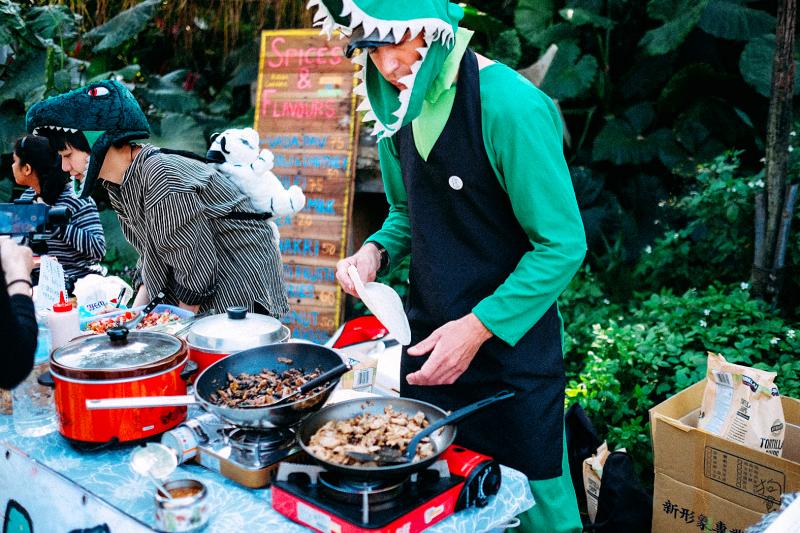This carnival ain’t for carnivores. Tiger Mountain is going meat free tomorrow to celebrate Earth Day with the second Taipei Veggie Fest, dubbed the “freshest party in town” by organizer Sean Scanlan. The extravaganza will feature all vegetarian and vegan food, arts and crafts, workshops and mostly performers who are vegetarian.
As usual, the main acts will rock the electric flower truck stage. This year’s lineup includes Dharma, a death metal band featuring a real life Buddhist nun; Pass the Vibe, a collective known for its hip-hop and freestyle dance battles and Balkan reggae-ska outfit Balkazar.
There will be both sober and beer yoga classes in the abandoned temple stage in the early afternoon, followed by more musical acts and DJ action that begins at the vinyl stage at sundown.

Photo courtesy of Taipei Veggie Fest
Food vendors include Falafel King, Dino Taco, 3 Idiots Curry, La Gritona and more. Bring your own plates, bowls, cups and utensils; there will be some cups for rent but no single-use tableware is allowed. Bring your own yoga mat.
■ Tomorrow from 2pm to midnight, Tiger Mountain (微遠虎山), 186-1, Ln 221, Fude St, Taipei City (台北市福德街221巷186-1號)
■ NT$400 in advance, $500 at the door
■ For more information, visit: fb.me/e/TGIktkaO

The unexpected collapse of the recall campaigns is being viewed through many lenses, most of them skewed and self-absorbed. The international media unsurprisingly focuses on what they perceive as the message that Taiwanese voters were sending in the failure of the mass recall, especially to China, the US and to friendly Western nations. This made some sense prior to early last month. One of the main arguments used by recall campaigners for recalling Chinese Nationalist Party (KMT) lawmakers was that they were too pro-China, and by extension not to be trusted with defending the nation. Also by extension, that argument could be

Aug. 4 to Aug. 10 When Coca-Cola finally pushed its way into Taiwan’s market in 1968, it allegedly vowed to wipe out its major domestic rival Hey Song within five years. But Hey Song, which began as a manual operation in a family cow shed in 1925, had proven its resilience, surviving numerous setbacks — including the loss of autonomy and nearly all its assets due to the Japanese colonial government’s wartime economic policy. By the 1960s, Hey Song had risen to the top of Taiwan’s beverage industry. This success was driven not only by president Chang Wen-chi’s

Last week, on the heels of the recall election that turned out so badly for Taiwan, came the news that US President Donald Trump had blocked the transit of President William Lai (賴清德) through the US on his way to Latin America. A few days later the international media reported that in June a scheduled visit by Minister of National Defense Wellington Koo (顧立雄) for high level meetings was canceled by the US after China’s President Xi Jinping (習近平) asked Trump to curb US engagement with Taiwan during a June phone call. The cancellation of Lai’s transit was a gaudy

The centuries-old fiery Chinese spirit baijiu (白酒), long associated with business dinners, is being reshaped to appeal to younger generations as its makers adapt to changing times. Mostly distilled from sorghum, the clear but pungent liquor contains as much as 60 percent alcohol. It’s the usual choice for toasts of gan bei (乾杯), the Chinese expression for bottoms up, and raucous drinking games. “If you like to drink spirits and you’ve never had baijiu, it’s kind of like eating noodles but you’ve never had spaghetti,” said Jim Boyce, a Canadian writer and wine expert who founded World Baijiu Day a decade